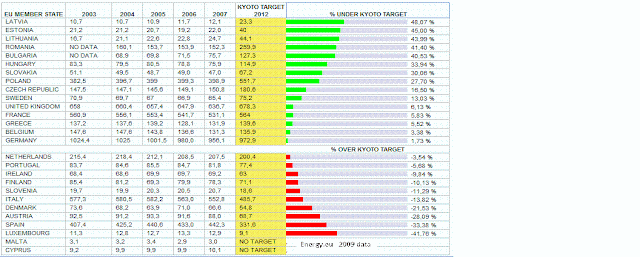88.1% of the world's energy comes from fossil fuels (in the EU 82% comes from fossil fuels, while in Malta it's 100% of course). The average person uses 2584 kwh however 77% of the world's energy is consumed by just 28% of the population. The European Union has long been trying to lower energy consumption and reduce reliance on fossil fuels, for two main reasons:
- Environmental Issues (such as global warming, health effects of pollution & the damage that pollution causes to ecosystems)
- Energy Dependency (most of the Union's fossil fuels are imported, resulting in a resource dependency).
Regarding the Environmental concerns, most of the EU member states had signed the Kyoto protocol, back in 1997, and many (15) have actually carried out the necessary cuts and measures which they promised they would, with Latvia ranking on top, cutting emissions to 48% lower than the Kyoto target. As you can see in the first graph, many countries didn't quite make the cut. Of course Malta is down at the bottom of the list alongside Cyprus for not having actually signed the protocol!
As for the dependency concern, Malta of course imports 100% of it's energy in the form of fossil fuels and is on the top of the list in the second chart, again alongside our friends Cyprus.
The EU aims to solve the problem of emissions and dependency with a two-pronged approach: reducing consumption and investing in renewable energy sources. The general public seems to have certain reservations on renewable energy in their homes, mainly because a lot of the choices (such as Photovoltaic cells and Wind Turbines) are pretty expensive! But, there are practical and easy ways to reduce your energy consumption in the home and also use more renewable forms of energy.
In the coming blog posts we'll give some simple hints and tips as to how to lower your energy bill and help save the enviornment at the same time and also share some ideas and experiences with you.
Check out the powerpoint presentation, prepared by members of 5elemento (www.5elemento.org), about the state of energy in the EU.






No comments:
Post a Comment